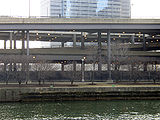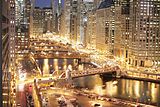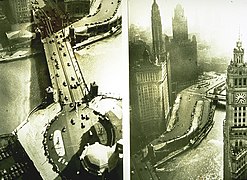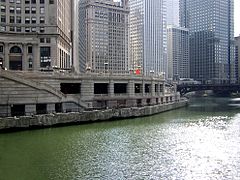Wacker Drive
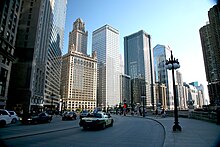 Upper Wacker Drive, looking west from Michigan Avenue | |
 Wacker Drive highlighted in red | |
| Former name(s) | Market Street Water Street River Street |
|---|---|
| Length | 2.2 mi (3.5 km)[1] |
| South end | Upper Wacker: Franklin Street/Harrison Street intersection (360 west at 424 south) Lower Wacker: Ida B. Wells Drive near Wells Street (220 west at 400 south) |
| East end | |
| Construction | |
| Inauguration | 1926 |
Wacker Drive is a major multilevel street in Chicago, Illinois, running along the south side of the main branch and the east side of the south branch of the Chicago River in the Loop.[2] The vast majority of the street is double-decked; the upper level is intended for regular street-level traffic, and the lower level for service vehicles, deliveries, waste collection, utility access, and through traffic. It is sometimes cited as a precursor to the freeway, though when it was built, the idea was that pleasure vehicles would use the upper level. Since it follows the curving path of the Chicago River, Lower Wacker Drive is the only street in the city that adopts both North–South and East–West designations.[a] In certain areas, there is a third level of Wacker Drive, often known as Lower Lower Wacker Drive or Sub-Lower Wacker Drive. This additional layer is primarily used for towing and impounding vehicles, utility infrastructure, and rail access in some areas. The street is named after early 20th-century Chicago businessman and city planner Charles H. Wacker.
History
[edit]In 1909, architects Daniel Burnham and Edward H. Bennett drew up a plan for the Commercial Club of Chicago to unify the city's urban design and increase its physical beautification. The improvement of traffic flow in Chicago was a major part of the plan. Among its many recommendations was a double-decked roadway along the river, intended to relieve the congestion at River Street and Rush Street, where 50% of the city's north–south traffic crossed the Chicago River. Charles H. Wacker, chairman of the Chicago Plan Commission, pushed the idea.
The original double-decker road, replacing South Water and River Streets, was completed in 1926 at a cost of $8 million and named after Charles Wacker. The 1926 section stretched from Lake Street to Michigan Avenue, the latter of which was also rebuilt into a two-level road.
An extension south to Congress Parkway and Harrison Street was built between 1948 and 1954, replacing Market Street (after the Market Street stub of the Lake Street Elevated was removed).[3] Extensions east were built in 1963 and 1975, with the latter taking it to Lake Shore Drive, and a new lower level starting at Stetson Avenue. At the time, Lake Shore Drive had an S-curve at the river, running where Wacker now goes between Field Boulevard and current Lake Shore Drive. This S-curve was on a viaduct over the Illinois Central Railroad's rail yard, and was at the level of Upper Wacker; the middle and lower levels dead-ended at that point. The current alignment of Lake Shore Drive was finished in 1986, and in 1987 Middle Wacker was extended to meet the new alignment. The ramps to bring upper traffic down had already been built; upper has been dead-ended where it used to end at Lake Shore Drive.

In 2001–2002, Wacker Drive was redesigned and reconstructed between Michigan Avenue and Lake Street. The original upper deck was crumbling, and the entire roadway did not meet modern standards for road widths and clearances. Using a specially-developed post-tensioned, reinforced, high-performance concrete cast-in-place system, the new road deck was expected to have a lifespan of 75–100 years.[4] Walkways along the river were meant to make the drive more pedestrian-friendly, while restoration of historic limestone elements and reproduction lighting evoked the drive's original 1926 appearance. The 20-month, $200-million project was completed on time and within budget.[5]
In spring of 2010, work commenced on rebuilding the north–south section of Wacker, from Randolph Street to Congress Parkway, including the upper and lower levels. This is a continuation of the Revive Wacker Drive project started in 2001.
Wacker is the only street to intersect both State Street (the east–west center line) and Madison Street (the north–south center line), although Lake Shore Drive and LaSalle Street/Drive[6] also each cross both dividing lines.
In April 2014, The American Council of Engineering Companies awarded the Wacker Drive and Congress Parkway Reconstruction project its Grand Conceptor Award. The project team was led by TranSystems and included roadway, bridge and tunnel improvement work. The project involved complex staging to keep 135,000 vehicles and 150,000 pedestrians moving through the construction zone each day.[7]
Intersections
[edit]The following streets intersect Upper Wacker Drive, from south to north and west to east. Most upper-level streets that end at Wacker Drive, with only right turns allowed, are not included.
The entire route is in Chicago, Cook County.
| mi[8] | km | Destinations | Notes | ||
|---|---|---|---|---|---|
| 0.0 | 0.0 | Harrison Street (600 South) / Franklin Street (300 West) | Southern terminus; no access to Upper Wacker northbound | ||
| 0.2 | 0.32 | Ida B. Wells Drive | Northbound entrance only | ||
| 0.2 | 0.32 | Van Buren Street (400 South) | |||
| 0.3 | 0.48 | Jackson Boulevard (300 South) | |||
| 0.4 | 0.64 | Adams Street (200 South) | |||
| 0.5 | 0.80 | Monroe Street (100 South) | |||
| 0.5 | 0.80 | Madison Street (1 North/South) | |||
| 0.6 | 0.97 | Washington Street (100 North) | |||
| 0.7 | 1.1 | Randolph Street (150 North) | |||
| 0.8 | 1.3 | Lake Street | No access to Lake Street westbound from Upper Wacker Drive northbound | ||
| 0.9 | 1.4 | Franklin Street (300 West) | |||
| 1.0 | 1.6 | Wells Street | |||
| 1.1 | 1.8 | LaSalle Street (140 West) | |||
| 1.2 | 1.9 | Clark Street (100 West) | |||
| 1.2 | 1.9 | Dearborn Street (36 West) | |||
| 1.3 | 2.1 | State Street (0 East/West) | |||
| 1.3 | 2.1 | Wacker Place | Eastbound exit only | ||
| 1.4 | 2.3 | Wabash Avenue (44 East) | |||
| 1.5 | 2.4 | Michigan Avenue (100 East) | No access to Upper Wacker Drive westbound from Michigan Street northbound or Upper Wacker eastbound from Michigan northbound | ||
| 1.6 | 2.6 | Stetson Avenue | |||
| 1.7 | 2.7 | Stetson Avenue | |||
| 1.7 | 2.7 | Columbus Drive | |||
| 1.9 | 3.1 | St. Regis Chicago | Eastern terminus | ||
| 1.000 mi = 1.609 km; 1.000 km = 0.621 mi | |||||
The following streets intersect Lower Wacker Drive, from south to north and west to east.
The entire route is in Chicago, Cook County.
| mi[9] | km | Destinations | Notes | ||
|---|---|---|---|---|---|
| 0.0 | 0.0 | Harrison Street (600 South) / Franklin Street (300 West) | Southern terminus | ||
| 0.1 | 0.16 | Ida B. Wells Drive | Northbound entrance and southbound exit | ||
| 0.9 | 1.4 | Post Place | |||
| 1.2 | 1.9 | Garvey Court | |||
| 1.3 | 2.1 | Wacker Place | Eastbound exit only | ||
| 1.5 | 2.4 | Michigan Avenue (100 East) | |||
| 1.5 | 2.4 | Beaubien Court | Eastbound entrance and exit only | ||
| 1.6 | 2.6 | Stetson Avenue | |||
| 1.7 | 2.7 | Columbus Drive | |||
| 2.0 | 3.2 | ||||
| 1.000 mi = 1.609 km; 1.000 km = 0.621 mi | |||||
In popular media
[edit]- The 1980 film The Blues Brothers used Wacker Drive as a setting.[10]
- The car chase scene in The Dark Knight (2008) was filmed on Lower Wacker Drive.[11]
- The music video for "Burnin' " pays tribute to Chicago house producers that Daft Punk found inspiration in.[12]
Gallery
[edit]-
Two aerial views in 1926
-
A side view, as seen from the Chicago River
-
Wacker Drive in downtown Chicago
-
A view of Wacker Drive and the Chicago River looking east from Merchandise Mart in February 2017
-
View of East Wacker skyscrapers from Lake Point Tower, July 2022
See also
[edit]- Multilevel streets in Chicago
- Philo Carpenter
- Buildings on Wacker Drive
Explanatory notes
[edit]- ^ The western portion of the street is called North Wacker Drive and South Wacker Drive, while the northern portion is called West Wacker Drive and East Wacker Drive.
References
[edit]- ^ Google Maps estimate.
- ^ Hayner, Don and Tom McNamee, Streetwise Chicago, "Wacker Drive", p. 129., Loyola University Press, 1988, ISBN 0-8294-0597-6
- ^ Garfield, Graham. "Market Terminal". Chicago-L.org. Retrieved 2008-01-04.
- ^ "Reviving a Landmark". Roads and Bridges. October 2001. Retrieved 2022-01-13.
- ^ "Revive Wacker Drive project". 2003. Retrieved 2008-01-04.
- ^ LaSalle Street is principally a north-south roadway. North of North Avenue however, LaSalle Drive runs generally east-west, intersecting with Clark Street, Stockton Drive, and Lake Shore Drive. Dearborn Parkway, State Parkway, and Astor Street do not exist north of North Avenue; LaSalle Drive crosses State Street/Parkway's 0-E/W meridian while transiting the southern edge of Lincoln Park.
- ^ "TranSystems - TranSystems' Wacker Drive Reconstruction Wins Top Honor from ACEC".
- ^ name=google_maps
- ^ name=google_maps
- ^ "The Blues Brothers - Chicago Filming Locations". Locations in the Blues Brothers. Archived from the original on May 24, 2008. Retrieved December 16, 2008.
- ^ "The Dark Knight (2008) - Filming Locations". IMDb.com, Inc. Retrieved 28 November 2016.
- ^ "Daft Punk - Burnin' (Official Video)". Vimeo. Retrieved 2019-04-13.
External links
[edit] Media related to Wacker Drive at Wikimedia Commons
Media related to Wacker Drive at Wikimedia Commons- Official City of Chicago Loop Community Map





